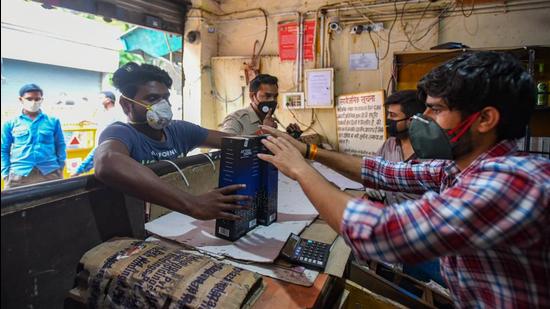Excise transition: Private liquor vends to stay shut next month
Deputy chief minister Manish Sisodia, who is also Delhi’s excise minister, said that the government expects to earn another ₹3,500 crore revenue in the first year once the new liquor stores begin operations.
All private liquor vends in Delhi will shut next month and only government stores will function until the Capital transitions to a new excise policy on November 17, the administration said on Wednesday, adding that it earned R8,900 crore from auctioning retail licences in the Capital’s newly created 32 zones.

Delhi has 849 liquor stores, of which 276 are privately-run and the rest are operated by the Delhi government through its agencies. On November 17, the government will fully withdraw from the alcohol business in an attempt to usher in greater transparency, revenue and service quality.
“All private vends having L-7 and L-10 licenses, both of which deal with retail sale of Indian and foreign liquor, will operate only till September 30. This is to ensure a smooth transition for the new licensees to take over. Government vends will continue till November 16. Government vends selling country liquor will be allowed to operate till March 2022. Restaurants, bars and clubs will face no problem in keeping up their stocks as wholesale sale of liquor is not being stopped,” said a senior excise official.
Deputy chief minister Manish Sisodia, who is also Delhi’s excise minister, said that the government expects to earn another ₹3,500 crore revenue in the first year once the new liquor stores begin operations.
“The bidding took place in a very fair manner. We received roughly 250 bids for the 32 zones. The highest bid in each zone won in a very transparent manner. Soon, the customer experience of buying liquor in Delhi will change drastically,” Sisodia said, adding that the experience of buying alcohol in the capital was very restrictive earlier as people had to go to shady shops with “jail-like grilles”.
The Delhi Excise Policy, 2021 mandates the government’s exit from the liquor business in an attempt to shore up liquor availability, customer experience, service and eradicate brand suppression.
Of the 32 zones, the draw for 20 zones was done on August 5 and 6; the remaining 12 were allotted this week. The excise department had kept a total reserve price for all the 32 zones at around ₹7,041 crore, but it managed to earn ₹8,917.59 crore through bidding, documents show.
Excise department reports showed that Zone 28 covering areas such as Dwarka-A, Deoli, Bhajanpura, Kardampuri and Quraish Nagar, had the highest bid at Rs357 crore. But when analysed in terms of the highest profit earned by the government against the base price, Zone 32, which is the airport zone, topped the list as it went for ₹235 crore against the reserve price of Rs105 crore — about 124% higher than the reserve price.
In addition to the bid value for the 32 zones, the excise department will also earn about ₹650 crore from excise duty, import fees, value-added tax and other licence fees, an excise official said on condition of anonymity. Another ₹900-1,000 crore is expected to come from licensing of new brands, distributor licenses, etc.
The government is optimistic that this will mark a new record for the capital, and push annual earnings growth rate from the current 5-7% to over 30%. Data showed that the average annual revenue of the city from liquor sales over the past three years stood at around ₹6,300 crore.
The new excise policy was implemented on June 11. Under it, retailers are free to decide the selling prices in a competitive environment and not be limited by a maximum retail price fixed by the government. Each zone will have at least 27 liquor vends — all of which will go to one successful bidder.
The new policy aims to reform the city’s liquor business by improving user experience, cleaning up the liquor mafia and eradicating pilferage.
The licensees will have to build bigger and modern liquor vends where customers could just walk in and choose their preferred brands. Business hours will be from 10am to 10pm while those at the airport may stay open round-the-clock.
The policy, among other things, envisages five new super-premium liquor shops for high-value products. It includes a rule that any liquor shop in the city should be at least 500 square feet in size and not have iron grilles at the front, giving customers the freedom to pick their own brands.
For that, the shops have to be spacious, well-lit and air-conditioned and must be under camera surveillance. Shop owners will have to ensure that liquor sale and pick-up takes place properly inside the shop premises. Home delivery of liquor is also allowed through websites and apps.
But those in the liquor business felt the government should have set the reserve price higher.
Naresh Goyal, president of Delhi Liquor Traders’ Association,said the ₹8,917.59 crore for the 32 zones is a “commitment” made by the new licensees which they will have to pay in instalments for a year. “Ideally, the government should have kept the reserve price higher, factoring in 10% annual hike which did not happen since 2019 due to the pandemic. So, the amount it has managed through the bidding process is not exceptionally high. We can say that the government just managed to recover the excise revenue losses it faced due to the pandemic,” Goyal said.




